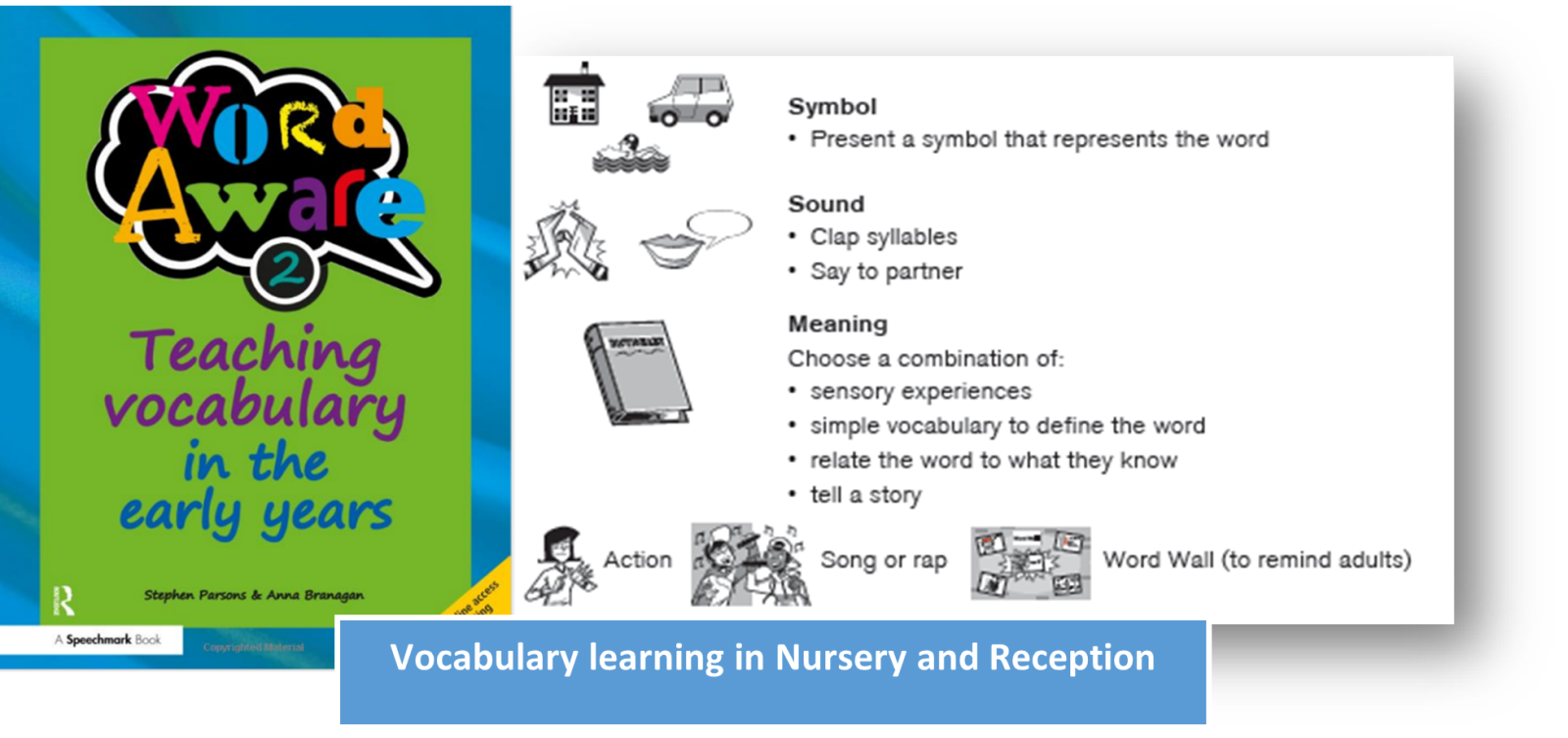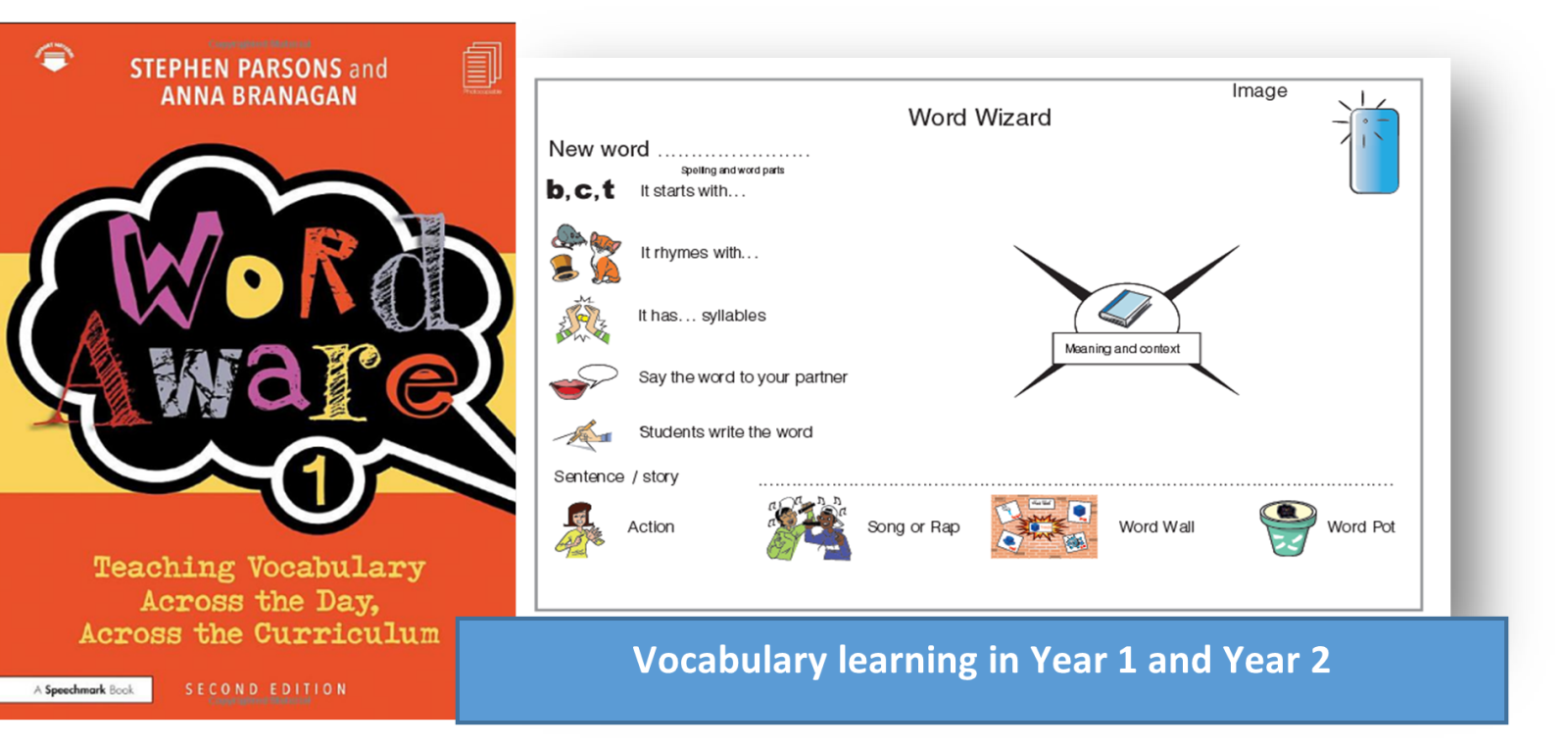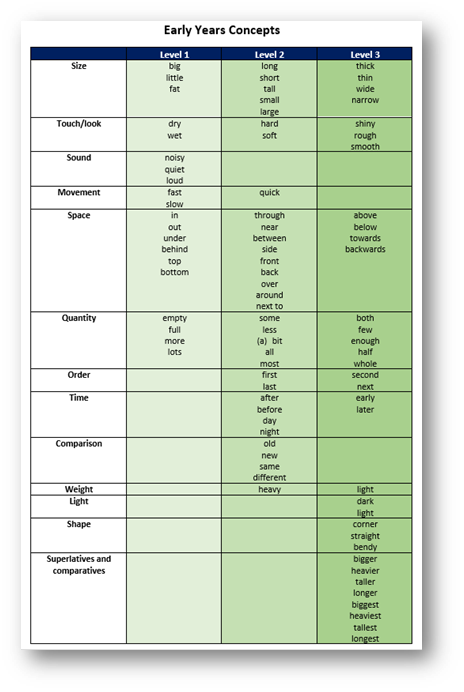Vocabulary and Language Teaching
Did you know that research shows that spoken language abilities at 5 years of age predict their reading at 15? As adults, we need to know at least 30,000 words. Most of these words are learnt in childhood which means children need to learn seven new words every day!
At school, vocabulary impacts on the curriculum because to comprehend what we read, to master mathematics or to make sense of science, geography or art, we must first understand the words that are used and what they mean. Vocabulary is key to learning and progress across the whole curriculum. This is why we begin explicitly teaching vocabulary in our Nursery and Reception classes and right the way through the school.
We use the WORD AWARE approach to explicitly teach new words. Although there are differences in what we do depending on the age of the children, essentially, after the new word is presented in written form and with an image, children say and write the word, exploring the initial sounds and any rhyming words. Children explore the meaning of the word with a definition and hear the word in a sentence and short story. We also teach the children actions and sing a simple song or rap using the word to support them to remember. Teachers continue to use the word regularly and ensure that children use it correctly in their speech or when they read or write it. We also regularly revisit previous words taught to support the children to remember them long term.


In Nursery and Reception, we ensure that all children have a good understanding of key concept words. Our progression of concepts develops so that by the end of Reception, all children understand the following key concepts:

We have also selected the key vocabulary that children need to acquire in each curriculum subject. See our Progression of Knowledge and Skills grids for each subject for more information.
How can parents support children’s vocabulary development?
Reading to your child is one way to expose your child to more words. If you come across an interesting word in a book, try and use it again in a conversation with your child.
Talking is important. It is closely linked to reading, writing and learning. By playing simple speaking and listening games you may not think you are developing reading and writing, but you are. Get talking!
Word games
1. ‘I spy’. ‘I spy’ is a familiar game, but it is great for learning language and phonics as well as filling in time on journeys. On the bus or in the car one player looks around and spots one item. They then give a clue ‘I spy with my little eye, something beginning with’ (and then say the letter). All other players guess.
2. Big brain. ‘Big brain’ is a variation on ‘I spy’ but rather than seeing something you need to think of an object and the letter it starts with. Great for playing when you are waiting somewhere. For instance: ‘I think with my big brain something that is cold starts with an “I”.’
3. Alphabet lists. Choose a category: it might be something like clothes, food or TV programmes. Then choose a letter. See how many words you can think of from that category that start with the target letter. e.g.: clothes starting with ‘s’: scarf, socks, sweatshirt.
4. One for the bus or car. Start with calling out ‘a’. Everyone then tries to spot something that starts with an ‘a’. When someone has called out an item starting with ‘a’ you can move on to ‘b’ and so on through the alphabet.
5. ‘If I was king/queen for a day.’ Ask your child ‘If you were a king/queen for a day what would you do?’ Give them some time to think of an answer, but once they have answered, ask them why they chose that action. Encourage your child to ask other people what they would do if they were king/queen for a day.
6. Team topic. On the bus or in the car, think of a topic and see how many things you can think of as a team in a set time. A minute might be enough. You can choose any topic but here are some ideas for inspiration: living things, things with wheels, things that make loud noises or things made of metal.
7. Change the story. Take turns to tell well-known stories with your child but make small changes to the story and see where that takes you. Change the character, the setting or the ending. You might have ‘Big Red Riding Hood’ or ‘Goldilocks and the Three Kittens’. What would Big Red Riding Hood do to the wolf?
8. Build a story. One person starts a made-up story with one sentence, such as ‘Once upon a time an enormous giant was sleeping when . . .’ Other players then take turns to build on the story one sentence at a time. This is great to play in a group but is also fun when there are just two of you. Get creative and see what twists and turns you can add to your story. Add as much exciting vocabulary as you can.
9. What does it do? This is another game for journeys: one player calls out an object that they see, and the next person tries to think of five things that it can do / that can be done with it. For instance: ‘tree’ – climb, chop, grow, fall down, and absorb carbon dioxide. If you are stuck indoors, you can look around you or in books and play the same activity. Younger children can just think of one or two things to do with an object.
10. What would you do? Think up small problems that your child might encounter such as getting lost, losing money, finding a mobile phone etc. Ask your child what would they do? Why? Ask other people what would they do and why. Which one is the best? Why? All of this is good practice with reasoning skills which are really important for lessons such as science as well as learning social skills.
11. Word associations. One player starts by saying a word. The next player says a word that is related to the first word. It can be related in any way. If another player cannot see how the words are related, they can challenge, and the connection needs to be explained. Keep going until a word is repeated or a connection cannot be explained. Here is an example: Egypt – Mummy – Dad – beard – Santa Claus – Christmas – trees – leaves - autumn.
12. Ways to say. Brainstorm different ways of talking like ‘mumbling, bellowing, whispering, croaking, and sobbing’. Check that all players know what they mean and have fun acting them out. Write the words on pieces of paper, scrunch them up and place them in a hat. Choose a simple phrase such as ‘It’s almost 4 o’clock.’ Take turns taking a word from the hat, saying the phrase in that style, while others try to guess (and laugh!)
Supporting children to develop language
Below you will find a number of videos to help parents understand how to better support general language development.
1 Year Olds
2 Year Olds
3 Year Olds

At Wallace Fields Infant School & Nursery, we have been successfully using the WellComm language intervention a number of years. It is built upon fun, child-friendly activities with the aim to accelerate development in early language skills.
Wellcomm is a speech and language toolkit for children aged 6 months to 6 years. It helps teachers to understand children’s current level of speech and language and then provides a range of activities to help support their language development.
A child will be assessed for around 10-15 minutes on their understanding of what is being said to them (receptive language) and also how they communicate verbally (expressive language). Some of the assessment is completed through specific activities and some through our everyday observations. The needs of the child are taken in to consideration and the toolkit may be completed over several stages.
Wellcomm plays a crucial role in identifying children with potential language difficulties and offers a range of customised intervention activities to help support them. The screening tool uses a traffic light system to help us as teachers to understand the child’s current level of speech and language and to provide a pathway for action, ensuring every child gets the support they need.
Consider referral to a specialist service for further advice/assessment
Extra support and intervention required
No intervention currently required
If you have any concerns about your child’s language development, you should speak to your child’s class teacher in the first instance.
